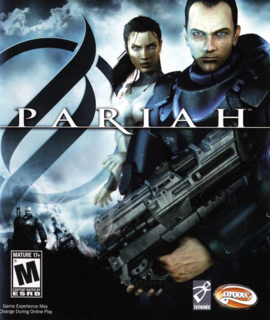"Pariah"
"Pariah" starts out with promise aplenty. A mysterious ship transporting a cryogenically frozen woman crash lands on Earth, which as a planet is now the refuge of criminals and mercenaries. Shot down by unknown attackers, Dr. Jack Mason and said token femme seem to be the only survivors, but as luck would have it she's infected with some kind of super-virus that could be all kinds of trouble in the wrong hands. And, as is par for the course with these things, the wrong hands are certainly trying to claim her so that they can harness the power she possesses. It's seemingly up to Jack to forego his Hippocratic oath and thwart these evil ambitions by killing lots and lots of bad guys. After that, the story gets quite muddled and certainly wouldn't be one of the game's stronger points except for an ambitious twist at the end that breathes fresh life into something that seemed virtually D.O.A.
In terms of gameplay, "Pariah" flirts with a few innovations that truly are interesting. First, the hero character's medical background makes him adept at healing himself. The tool he uses for this task is located in Jack's inventory alongside his weapons, and is in fact used like a weapon, complete with ammunition that must be gathered to make it of any further use. When selected a quick pull of the trigger initiates the healing process. The fact that this item is used much like a weapon and cannot merely be summoned with the press of a button for an instant resurgence of health adds a strategic element to the game's firefights. Run in with guns blazing and you'll die almost every time because using the medical tool is a deliberate and time-sensitive process. Not only does this fit in extremely well with the hero character's profession, it's a unique spin on health recovery in the FPS genre that I hope to see again in other games. It promotes an attack and retreat philosophy similar to the regenerating shields in "Halo" (which is no doubt the source of inspiration).
Second and perhaps even more importantly, "Pariah" offers several satisfying weapons, each one with no less than three available upgrades (apart from the useless melee weapon and an energy canon found late in the single player game). Upgrading these weapons further adds a dose of strategy, pure coolness notwithstanding. But because you never accrue enough points to enhance each weapon in your arsenal, there is the aforementioned strategic concern. Do you upgrade your shotgun to deal maximum damage to your opponents in close quarters, or do you enhance your more well-rounded assault rifle instead? The choice is yours, and these upgrades really do make a discernable impact on how punishing said weapon becomes as you near the end of the game. Again, this is a feature more shooters should pay rapt attention to.
Apart from these innovations, however, "Pariah" is fairly derivative in its structure, owing a tremendous debt to the aforementioned FPS hits "Halo" and "Far Cry." The game's drivable vehicles are testament to this fact, but add little to the experience thanks to their poor implementation and less than stellar driving mechanics. On top of that, many of the game's levels are boilerplate science fiction and offer little in the way of originality. That said, a few of the missions do stand out as particularly enjoyable - primarily two later ones which take place on board a speeding train and a flying carrier ship respectively. It's just that the art direction, which envelops the enemies as well as the landscapes, is just so bloody trite.
Clichés aside, the game sure is pretty. It takes the aging "Unreal II" engine to the max, and despite a few polygonal jags here and there, it ultimately provides some pretty sumptuous eye candy on the Xbox console. The sound effects are equally excellent for the most part. Weapons discharges in particular really enhance the sense of power each weapon emits.
Unfortunately, "Pariah" is chock full of bugs. On at least three occasions I slipped through the very floor and fell to my death. In no way shape or form is this acceptable in a supposedly finished product. Another grating issue is collision detection, which is spotty at best. Sometimes you can shoot a baddie three times and drop him dead where he stands, while other times your enemies seem to absorb your attacks and keep on coming without regard. Their herky-jerky movements, a holdover from "Unreal II," compound the issue, making them more difficult to drop than they should actually be.
Another negative feature on loan from its big brother is the overblown rag doll physics present in "Pariah." When reacting to explosions, the aerial death spins of your opponents can be quite satisfying, but when merely shooting them to death they drop to the ground, bending at angles so awkward you know there's nothing even remotely resembling a skeleton anywhere inside of them. It's as if they've all been stuffed with rice. Add into the mix an automatic weapon switch that can put a rocket launcher in your hands at close range when you just used up the ammo for your assault rifle, an insanely unpredictable check point system, and vague mission objectives such as "disable the turret," and you certainly can't order "Pariah" without its fair share of lemons.
In the end, though, "Pariah" softens its hard edges with a few key features that really should become the fashion in shooters, as well as decent production values, slick, responsive controls, and a story that redeems itself with a ballsy conclusion. As far as FPS games go, "Pariah" is far from king of the hill, but just as far from the bottom of the junk heap. If science fiction shoot `em ups are your bread and butter, you'll feel right at home here.

